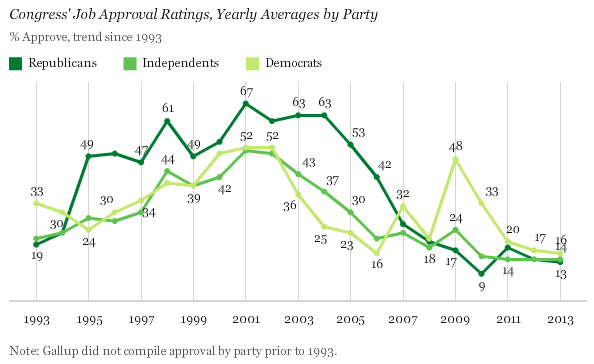The news is mixed for Republicans as Gallup provides new insight on the political parties with which Americans are identifying, or, increasingly, not identifying.
Gallup found that only 25% of Americans now identify with the Republican Party when given the choice of Republican, Democrat or independent. This is a lower number than we have seen at any time since 1988. Self-identified independents have risen to a new high of 42%. Democrats are in between at 31%.
We can expect the predictable take from those within the party to explain the decline. Many conservatives will argue the decline is because elected officials don’t follow “the platform” and “don’t stand for anything.” Moderates will claim the decline is because the party has become “too conservative” and has “lost the center.”
Gallup suggests both arguments miss the mark.
“The rise in political independence is likely an outgrowth of Americans’ record or near-record negative views of the two major U.S. parties, of Congress, and their low level of trust in government more generally,” says Gallup.
While Democrats hold the Senate, it is generally perceived that Republican control of the House makes the GOP most responsible for “Congress,” with its dismal 14% approval. For those who would dismiss this number by claiming Americans always dislike Congress, it is worth noting that in 2001, 56% of Americans approved of the job Congress was doing.
A common mistake made by candidates and members of the news media is to assume that independent voters are by definition ideological centrists, and that growth among independents is therefore driven by philosophical perceptions. This, however, is often not the case. Many independents would be more accurately described as “ambivalents,” not particularly interested or engaged politics. While many elected officials for whom politics is an occupation, and reporters who make covering politics their occupation, may find it difficult to believe, many Americans simply don’t care about politics as much as they do, and are therefore less likely to pick a side. I feel the same way about European soccer teams.
The ambivalence factor is reflected in the fact that independent voters are more likely than partisans to make their mind up about candidates late, if at all, and they are less likely to actually vote. The lower voter turnout rate among independents is particularly visible in special elections, primaries, and other non-Presidential elections.
While this does not explain the growth in the number of independents, it casts even more doubt on claims that Americans are turning away from political parties for purely ideological or philosophical reasons.
The stronger correlation can be found for Republicans among public perception of Congress, which after sitting at about 20% in 2010, has only dropped further in the three years that Republicans have controlled the House. Significantly, divided control of Congress is not doing anyone any favors. Generally, Republicans help to drive approval of Congress higher when Republicans have majorities in both chambers, while Democrats drive approval higher when they are in control. Today, members of both parties, plus independents, all disapprove of the job Congress is doing.
What will be the impact in November? The good news for Republicans is we currently lead in generic ballot tests and Democrats have taken a serious pounding due to the Obamacare rollout flop and the President’s low approval numbers. However, candidates and campaign teams may find voters waiting longer to decide for whom to cast their ballot, and more careful attention should be paid to turning out supporters.


